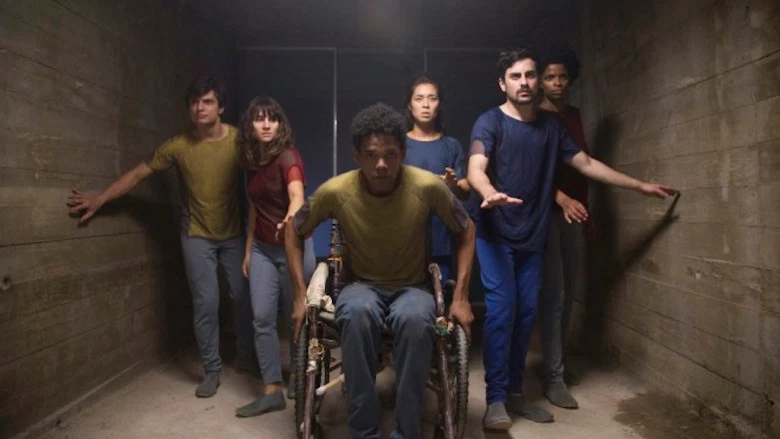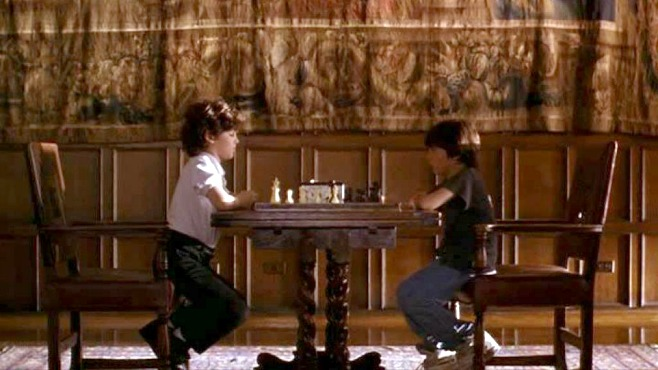3% Season One Review

Addressing thousands of anxious youth dressed in hand-me-down rags, Process Leader Ezequiel declares that they all “create their own merit — everything will work out, because [they] deserve it.” Ezequiel holds the most important position in the fictionalized dystopian society of Netflix’s recently released 3% — he runs the annual “Process,” in which all 20-year-olds hailing from the destitute Inland compete to prove themselves to be among the top three percent of the population privileged to live in the utopic Offshore. The proposition of being responsible for one’s own merit, as told by a white man donning the sleek jumpsuit of the elite class, is just another iteration of the “pull yourself up by your bootstraps” narrative spat at financially flailing communities in any supposedly equal opportunity, laissez-faire economy.
The first few episodes entertain by combining THE HUNGER GAMES with THE GOBLET OF FIRE. Games that test spatial skills (making cubes out of polygons) and inductive reasoning (determining the reality of a dinner table scenario) whittle the swath of 20-year-olds down to few enough where romances and rivalries can come into focus. Challenges like these are always fun to watch, even when they’re employed cheaply to reveal relevant character backstory with flashbacks. However, one would hope that drama is high enough after hours of content that the hook of such microcosmic competitions would no longer be necessary to propel the narrative. Contestants still undergoing these repetitive “tests” in the penultimate and final episodes exemplify 3%’s inability to bring anything fresh or subversive to an already overstuffed, high-concept premise of pitting lower class younglings against one another.

SEARCHING FOR BOBBY FISCHER’s first draft looked a lot more like BATTLE ROYALE
Of these youth, Michele, a white girl living alone in the colorful Inland slum, is presented as 3%’s protagonist as we peer through her personal experiences in the pilot episode. By the finale, the series has made an uncertain shift to an ensemble piece featuring half a dozen characterized Process contestants, as well as the sometimes-tyrant-sometimes-sweetheart Process Leader Ezequiel, who grapples in a political climate where the only discernable thing anyone wants is, blandly, more power. Each contestant character can be encapsulated by a single trait, which is exploited or illuminated into the same inner dilemma time after time. One of these internal conflicts is that a certain contestant keeps a potentially deadly secret: he or she is a mole planted by the revolutionary terrorist group known as The Cause.
With a name as vanilla as The Cause, it’s no surprise that the ideology behind an ideologically driven rebel group is never explored; they’re a cookie-cutter anti-oppression group presumably standing for “the people.” Every faction in this show is as lazily named, from The Council to The Founding Couple (not to mention, equally as bad, The Process). Simply reading the names of these seemingly important entities provides as much detail on them as you’d receive from watching the entire season of television.
Utilizing such archetypes is not inherently a problem, except that 3% treats itself with utmost importance. Extremely long lenses, wildly dutch angles, and a finale packed with loaded imagery communicates this show’s lack of humor. It’s made as though it’s the first sci-fi to expose corrupt politicians or religious fanatics. Even when it delved into teenage love triangles, HUNGER GAMES did it better — an episode of the thematically packed BATTLESTAR GALACTICA makes 3% look like GOOSEBUMPS next to BRAVE NEW WORLD. Ambitions of intellectual commentary is not the only place where 3% borrowed from sci-fi powerhouse BSG: The aforementioned long lens camerawork with an affinity for snap zooms is a page pulled straight from GALACTICA’S book. Drum-driven scores accentuate both shows, timpanis used throughout to back dramatic moments, large and small.

Who am I kidding? Aldous Huxley’s got nothing on this
While the music for these scenes isn’t groundbreaking, their content does usually work. The actors and directors of 3% are able to create strong emotional beats even though the scripts informing them are thin. Cesar Charlone, the Oscar-nominated cinematographer of the modern classic CITY OF GOD, directs a number of episodes. His presence is one to be thankful for, as he can keep overused locations and repetitive situations intriguing with his cinematic eye.
All of the unknown (to western audiences at least) Brazilian performers are due credit, as there’s not a bad one in the bunch. Whether murderously angry, mourning the death of a friend, or exchanging sly glances between one another, the characters are always expressive and true. Michael Gomes as Fernando is the star — the strongest actor with the most interesting role. Fernando is disabled from the waist down, his relegation to a wheelchair giving other contestants ample reason to doubt his chances at passing The Process. Gomes toes the line between dreamer and realist perfectly, the answer as to which he is remaining ambiguous and muddled all the way through the season. He’s far more engaging than Michele who, despite the heart imbued into her by actress Bianca Comparato, has an underwritten backstory and motivation that leaves her superficial and unmemorabable. Much like the show she’s the lead in.
The overall message of Netflix’s first Brazilian-produced and acted sci-fi parable can be induced from its heavy-handed title of 3%. Eight plotty episodes, while delivering several clever reversals and some tense moments, can’t elevate any of their political, interpersonal, or religious commentary above that of a mid-brow high school honors class.
Verdict: Do Not Recommend



